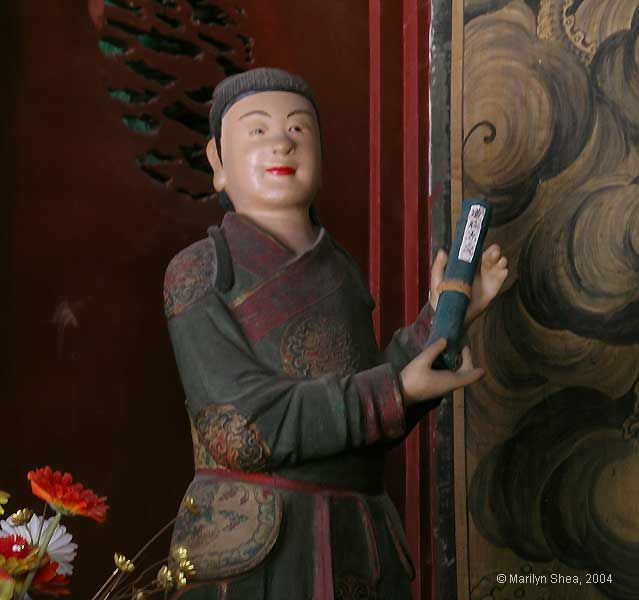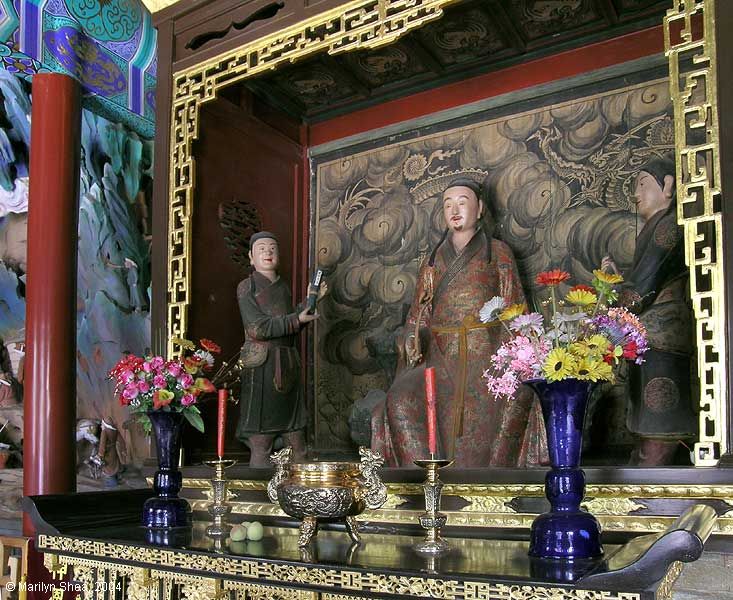A-li-sien and the others said to the master: "The southern route has much sand and is very stony; little grass and water are found there. Our traveling company is numerous; the horses will be extremely fatigued, and we have to fear many delays on the road." The master replied : "Then it would be better to start in three parties."
On the 7th of the fifth month (June 6), 1223, he sent six of his disciples in advance, and started himself with six disciples on the 14th (June 13). He was accompanied for twenty li, by the most respectable people of the place; then they got down from their horses, bowed before the master and shed tears. The master spurred on his horse and departed quickly. On the 18th the remaining five disciples set out.
Proceeding eastward, on the 16th (June 15) the master crossed a high mountain, which was covered with snow. It was very cold. The post-horses were changed near the tent.
On the 17th the master did not eat anything; he only drank rice-water from time to time. Proceeding to the south-east, we crossed a great sandy plain, where we found grass and trees infested with mosquitos. We passed the night on the eastern bank of a river. Farther on the master travelled from time to time in his cart. The disciples asked him from what complaint he suffered; to which he replied: "My malady cannot be understood by physicians; it is a purification by the help of the sainted men and the sages. I cannot get well suddenly; but you need not be anxious." The disciples were afflicted, and did not understand his words. Then one of them had a dream, in which a spirit said to him: "Be not alarmed about the master's sickness. After his arrival in China he will get well again." We proceeded by a sandy road for more than 300 li; water and grass were very scarce. We travelled uninterruptedly; even at night our horses did not rest. Finally, after two days we emerged from the sand, and were then near the northern frontier of the Hia (Tangut empire). Here huts and tents became more frequent, and we had less difficulty in getting horses. The disciples who travelled behind reached us here.
On the 21st of the sixth month (July 19), 1223, we stopped at Yü yang kuan. The master still continued to abstain from food. Next day we passed the customs barrier and reached fifty li to the east of it, Feng chou, where the first officers of the place came to meet the master, who began again to eat as he was accustomed to do.
We were then at the end of the summer, and the master was in the habit of sitting at the northern window of the house in which he stayed. At the request of the master of the house he wrote some verses on silk paper.
On the 1st of the seventh month (July 29) we started again, and arrived after three days at Hia shui. The next day we left, and on the 9th (August 6) arrived at Yün chung, where the master spent more than twenty days. The military commandant of Süan te sent an express to Yün chung with a letter to the master and an offer of cart and horses.
At the beginning of the eighth month (end of August) the master started, and proceeding eastward, we reached Yang ho, passed Po teng, T'ien ch'eng, Huai an, and crossed the river Hun ho. The commandant met the master far out of the city (of Süan te), and lodged him at the monastery Chao yuan kuan. The Taoists received the master with great distinction, and told him that in the last winter some of them saw Ch'ao kung (the disciple who died at Sairaui) entering the monastery and leading a horse by the bridle. All came to meet him, but he disappeared suddenly. He was also seen at other places.
The princes, dignitaries, commanders, and other officers in Northern China addressed letters to the master inviting him to visit them. These invitations succeeded each other like the spokes of a rolling wheel; but the master answered that he was sorry he could not divide himself into several bodies, to satisfy the wishes of all.
According to a vow taken at the time Ch'ang ch'un passed the battlefield of Ye-hu ling, covered with white human bones, there was on the 15th (September 10) a service performed by Ch'ang ch'un's disciples in Te hing, at the monastery of Lung yang kuan, to help the destitute souls to pass over. After the service, an officer from the emperor (Chinghiz) arrived to inquire about the master's journey, health, &c. Ch'ang ch'un spent the winter in Lung yang kuan.
The governor of Yen king (now Peking) and other officers from that city sent an express with a letter to the master, in order to invite him to stay in the monastery of Ta t'ien chang kuan, to which he assented. At Nan kou, in the monastery of Shen yu kuan, the Taoists of Yen king met him. The next day venerable old men, men and women, assembled from all sides, and accompanied the master with fragrant flowers when he entered Yen king, and the people bowing before him obstructed the road.
At the time the master started for the west, the friends wished to know when he would return, to which he replied: "In three years--in three years;" and indeed his prophecy was realised, for it was on the 7th of the first month (January 28), 1224, he arrived at the monastery of Ch'ang tien kuan.
[(Bretschneider:) Having brought back the venerable traveller from a long and painful journey to his native soil, I break off the narrative of his adventures. The Si yu ki continues Ch'ang ch'un's biography until his death ; but the further events of his life are of little interest, and have nothing to do with my programme. I will only briefly state that the master remained at Peking. By order of Chinghiz, the ground of the gardens of the northern palace of the Kin was given to him for the purpose of establishing there a Taoist monastery. This monastery was built on the S'iung hua island, and the people were forbidden to gather fuel in the park of the island and to fish in the lake. The master, who lived there, sometimes took a walk to the top of the hill on the island, and enjoyed the magnificent view he had of the surrounding Gardens. Farther on in the narrative we read: "On the 23d of the sixth month (July 8), 1227, it was reported to the master that, owing to heavy rain, the southern embankment of the lake had fallen down, and that the water had crushed into the eastern lake, so that it was heard at a distance of several li. After this all fish and tortoises disappeared, and the lake became dry." Ch'ang ch'un took this for an omen of his death, and indeed he died on the 9th of the seventh month (July 23), 1227.
pp. 104-107, E. Bretschneider's Mediæval Researches from Eastern Asiatic Sources. (New York: Barnes & Noble, 1888).

